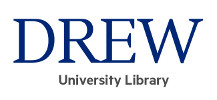 Research Guides
Research Guides Research Guides
Research GuidesScholarSearch is Drew Library's Google-like search of resources—both scholarly and not—available to our users. Unlike a Google search, your results will be reliable, trustworthy sources that you can use for your papers and projects.
ScholarSearch is a great starting point for your research. When you use ScholarSearch, you are searching for the many resources that are available at our library. This includes books, e-books, journal and newspaper articles (including peer-reviewed articles), book reviews, encyclopedia articles, government documents, streaming videos, and much more. It searches almost all of our databases at once!
The Library's catalog is called Locate. It provides a precise method for searching the Library's collection. You can use the catalog to find books, e-books, special collections, government documents, and other materials. You can also find these things using ScholarSearch, which mixes these items in with results from our database subscriptions. Both tools can be useful. Many students will prefer the greater range of results and ease of use of ScholarSearch, while others find the ability to limit results to items in the Drew collections and the ability to search certain specific facets to be very helpful.
Since the catalog focuses primarily on books, it's a good place to look for lengthy discussions of topics.
Databases are collections of information that can be searched. They hold journal articles, books, book chapters, indexes, bibliographies, audiovisual materials, and more. While most library databases have a specific subject focus, many are multidisciplinary, as well, and cover a variety of topics. Databases are specialized, scholarly resources that the Library subscribes to. You can explore the Library's databases by visiting the A-Z List. You can either browse them alphabetically, filter them by subject, type, or vendor, or search for something specific in the search box.
Reference Materials hold a wealth of information and are typically most useful for finding broad information on your topic. You may find a wide variety of information in reference materials such as historical backgrounds on a topic, governmental information, statistical information, definitions and more! Examples of reference materials include: encyclopedias, dictionaries, bibliographies, atlases, maps and even directories.
Some reference materials may be multidisciplinary, covering multiple topics, such as Gale eBooks while others may be subject-specific such as Birds of the World, which contains comprehensive life histories for all bird species and families including taxonomic information.
When selecting reference materials, ask yourself questions similar to those used when choosing a database, e.g what field/subject area does the question I am trying to answer belong?, etc.
One way to browse reference materials is to go to the Library's A-Z list, then choose "Reference Sources" from the All Database Types drop-down.
To find reference materials in a specific subject area, in the A-Z list select your subject from the All Subjects drop-down, then select Reference Sources from All Database Types. This will apply a two-layered sort. Example: Biology (All Subjects) + Reference Sources (All Database Types)
Databases can help you find primary, secondary and tertiary sources. Most people use databases to find scholarly articles in their field, but there are also archival, film, newspaper and image databases that may be helpful for finding sources.
Some databases are subject-specific, meaning that they specialize in a subject area. An example of this is EconLit, which provides full text articles from key economic journals. Some databases are multidisciplinary, which means that it has materials from a wide-variety of topics, such as Academic Search Premier.
When selecting a database, you want to consider:
To browse the databases in your field of study, go to the Library's A-Z list, then select the All Subjects dropdown and choose your subject area.
When conducting academic research for your assignments, it is often stressed that you need to use articles from a scholarly journal. Scholarly journals are also known as 'academic journals' or 'peer-reviewed journals'.
Characteristics of scholarly journals include:
Drew Library offers several options for accessing and/or browsing journals, including
Questions? Need Help? Email reference@drew.edu
Drew University Library, http://www.drew.edu/library